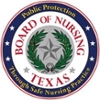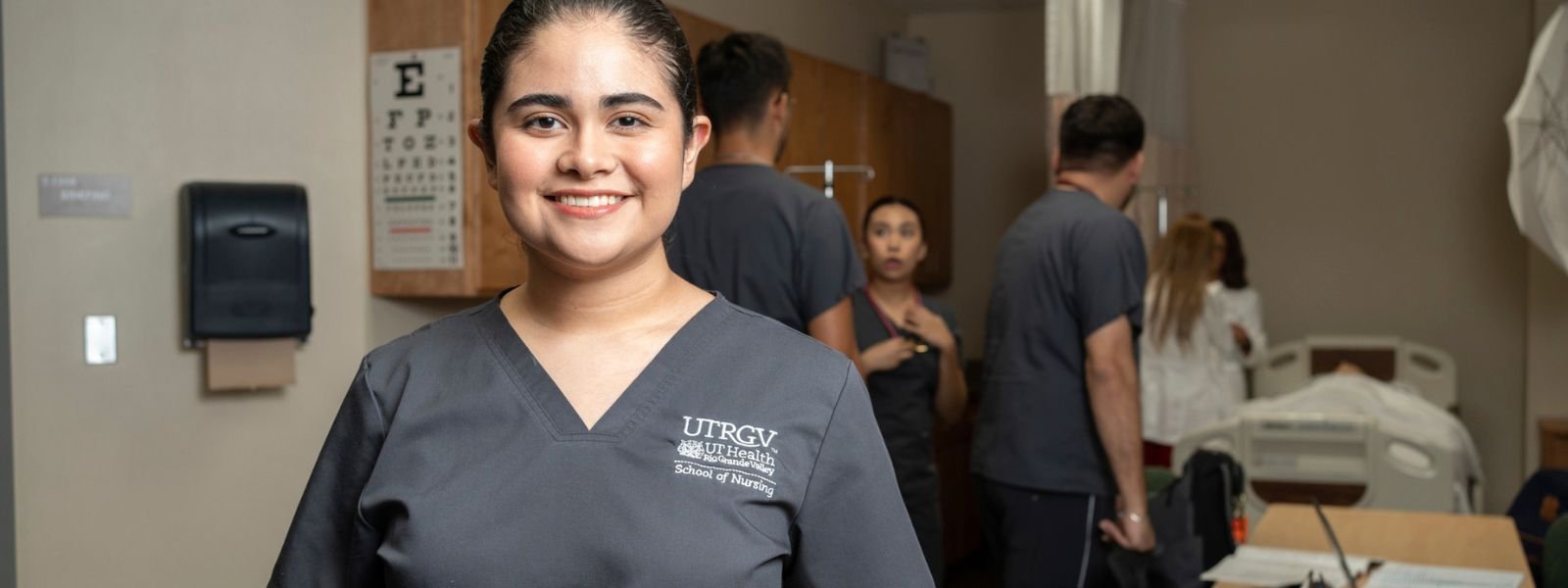The UTRGV BSN Program is designed to prepare graduates at a high level of competency for beginning positions in culturally diverse health care settings. The program fosters professional excellence by providing a climate in which intellectual achievement in nursing is encouraged and developed. The programs emphasize the preparation of students to meet the dynamic needs of the international, multicultural, and multilingual society in the Rio Grande Valley and beyond.
UTRGV School of Nursing offers three different pathways to obtain a Bachelor of Science in Nursing (BSN):
- Bachelor of Science in Nursing (BSN) is a generic BSN program for students who are not RNs.
- Second Degree Bachelor of Science in Nursing (BSN) for students who have a non-nursing bachelor’s or higher degree and are seeking a second bachelor’s degree.
- RN to BSN for students who have an Associate's Degree in Nursing (ADN) and are seeking a Bachelor’s of Science in Nursing (BSN).

The Bachelor of Science in Nursing is approved by the Texas Board of Nursing, 333 Guadalupe, Suite 3-460 Austin, TX 78701-3944, 512-305-7400

The Baccalaureate Degree in Nursing, master's degree in nursing, and the Post-Graduate APRN Certificate Programs at The University of Texas Rio Grande Valley are accredited by the Commission on Collegiate Nursing Education, One Dupont Circle, NW, Suite 530, Washington, DC 20036, 202-887-6791.
- Facilitate the development of practitioners with critical thinking skills.
- Provide holistic nursing care to individuals, families, and communities.
- Collaborate as a member of a multidisciplinary health care team to advocate for safe (mind-body-spirit), effective, and holistic client care, including the use of information technology, and being cognizant of cultural, societal, economic, political, and ethical-legal issues.
- Use the research process to identify nursing issues and evaluate research findings for applicability to nursing practice.
Bachelor of Science in Nursing
The Bachelor of Science in Nursing (BSN) Program is generic in nature with a pathway for registered nurses. The program is designed to enable students to integrate knowledge from theory and research, high-level skills, and concepts of leadership into the practice of professional nursing care of individuals, families, groups, and communities. The BSN Program provides a foundation for graduate study. BSN generic graduates are eligible to apply to the Texas Board of Nursing to take the National Council Licensure Examination. After successfully completing this examination, the graduate is issued a license to practice as a registered nurse in the State of Texas.
The BSN Generic Program has classes with face-to-face classroom instruction, campus labs, and in-hospital clinical labs. Instruction is guided by expert nursing faculty in collaboration with local hospitals.
It starts each Spring and Fall, and it takes four semesters to complete (Two years). Enrollment must be continuous.
The UTRGV BSN program is designed to prepare graduates at a high level of competency for beginning practitioners in a culturally diverse healthcare setting. The program objectives are as follows:
- Demonstrate critical thinking in the use of knowledge and theory from the behavioral, physical, and nursing sciences to provide safe, holistic (mind, body, spirit) client care in multicultural health care settings.
- Communicate effectively to establish trusting interpersonal caring relationships with individuals, families, groups, populations, and the community network.
- Assess the health care status of clients across their lifespan through the use of a knowledge base, data collection techniques, and nursing skills.
- Analyze the nursing needs of clients to assist in the development of nursing diagnoses, client goals, nursing care priorities, and teaching plans.
- Plan methods of assistance, including teaching, that aid clients to enhance learning, encourage self-care, and achieve optimal health.
- Implement the nursing care necessary to assist clients in reaching their health care goals.
- Evaluate health care activity and the responses of clients to that activity, modifying the nursing care plan as needed to promote optimum health.
- Practice culturally competent nursing within the bounds of professional standards and ethics, client rights, and legal statutes.
- Collaborate as a responsible member of a multidisciplinary health care team to advocate for safe, effective, and holistic culturally congruent client care, utilizing appropriate resources as necessary.
- Demonstrate leadership, responsibility, and accountability in the practice of nursing and the management of health care personnel, being cognizant of societal, economic, political, and technological trends.
- Use the research process to identify nursing issues and evaluate research findings for applicability to nursing practice.
- Demonstrate commitment to the nursing profession.
client=individuals, families, groups, populations communities and society
Second Degree Bachelor of Science in Nursing (BSN)
The Second Degree Bachelor of Science in Nursing (BSN) Program is specifically designed as a pathway for students who already possess a bachelor’s degree in a discipline other than nursing. The program is designed to build on past educational achievements to earn a BSN degree in four consecutive semesters. This program prepares graduates for state board exams and licensure in nursing. The program follows the same curriculum as UTRGV’s BSN Program.
The accelerated 15-month program has classes with face-to-face classroom instruction, campus labs, and in-hospital clinical labs. Instruction will be guided by expert nursing faculty in collaboration with local hospitals.
The UTRGV Second Degree BSN program is designed to prepare graduates at a high level of competency for beginning practitioners in a culturally diverse health care setting. The program objectives are as follows:
- Demonstrate critical thinking in the use of knowledge and theory from the behavioral, physical, and nursing sciences to provide safe, holistic (mind, body, spirit) client care in multicultural health care settings.
- Communicate effectively to establish trusting interpersonal caring relationships with individuals, families, groups, populations, and the community network.
- Assess the health care status of clients across the lifespan through the use of a knowledge base, data collection techniques, and nursing skills.
- Analyze the nursing needs of clients to assist in the development of nursing diagnoses, client goals, nursing care priorities, and teaching plans.
- Plan methods of assistance, including teaching, that aid clients in enhancing learning, encouraging self-care, and achieving optimal health.
- Implement the nursing care necessary to assist clients in reaching their health care goals.
- Evaluate health care activity and the responses of clients to that activity, modifying the nursing care plan as needed to promote optimum health.
- Practice culturally competent nursing within the bounds of professional standards and ethics, client rights, and legal statutes.
- Collaborate as a responsible member of a multidisciplinary health care team to advocate for safe, effective, and holistic culturally congruent client care, utilizing appropriate resources as necessary.
- Demonstrate leadership, responsibility, and accountability in the practice of nursing and the management of health care personnel, being cognizant of societal, economic, political, and technological trends.
- Use the research process to identify nursing issues and evaluate research findings for applicability to nursing practice.
- Demonstrate commitment to the nursing profession
client=individuals, families, groups, populations communities and society
Second Degree Bachelor of Science in Nursing (BSN)
The School of Nursing Accelerated RN to Bachelor of Science in Nursing Program is designed for the RN who graduated with an Associate Degree in Nursing Program; structured to meet the busy RN's schedule.
-
- 100% Online Accelerated Nursing Core
- Full time or Part Time; 7 week courses (modules)
- The full time 100% Online Accelerated Nursing Core can be completed in less than one year.
- The part time 100% Online Accelerated Nursing Core can be completed in less than 1.5 years.
- Current Curriculum for RN to BSN Program 7 week modules:
- RN to BSN Core – 30 hours
- Module 1 -
- NURS 3301 Professional Mobility [LS2]
- NURS 4303 Issues in Nursing
- NURS 3404 Pharmacology
- NURS 4201 Community Health
- NURS 4202 Community Health Clinical
-
- Module 2 -
- NURS 3313 Pathophysiology
- NURS 4302 Research
- NURS 3305 Client Assessment
- NURS 3105 Client Assessment [LS1]
- NURS 4306 Leadership in Nursing
- NURS 4307 Leadership in Nursing Clinical
Cost of the program:
RN to BSN cost per credit hour (CH) is $277.78
The total Program is 30 Credit Hours and program cost is approximately $8,333.33
plus, a graduation fee of $50. The total estimated cost is $8,383.33
-
The UTRGV Second Degree BSN program is designed to prepare graduates at a high level of competency for beginning practitioners in a culturally diverse health care setting. The program objectives are as follows:
- Demonstrate critical thinking in the use of knowledge and theory from the behavioral, physical and nursing sciences to provide safe, holistic (mind, body, spirit) client care in multicultural health care settings
- Communicate effectively to establish trusting interpersonal caring relationships with individuals, families, groups, populations, and the community network
- Assess the health care status of clients across the lifespan through the use of a knowledge base, data collection techniques and nursing skills.
- analyze the nursing needs of clients to assist in the development of nursing diagnoses, client goals, nursing care priorities, and teaching plans
- Plan methods of assistance, including teaching, that aid clients to enhance learning, encourage self-care and achieve optimal health
- Implement the nursing care necessary to assist clients in reaching their health care goals
- Evaluate health care activity and the responses of clients to that activity, modifying the nursing care plan as needed to promote optimum health
- Practice culturally competent nursing within the bounds of professional standards and ethics, client rights, and legal statutes
- Collaborate as a responsible member of a multidisciplinary health care team to advocate for safe, effective, and holistic culturally congruent client care, utilizing appropriate resources as necessary.
- Demonstrate leadership, responsibility, and accountability in the practice of nursing and the management of health care personnel, being cognizant of societal, economic, political, and technological trends
- Use the research process to identify nursing issues and evaluate research findings for applicability to nursing practice
- Demonstrate commitment to the nursing profession
client=individuals, families, groups, populations communities and society
The conceptual framework of the UTRGV School of Nursing curriculum contributes to the development of the course content to advance the knowledge, skills, and attitudes of all its graduates. Grounded on the SON philosophy and mission, the curriculum is centered on the belief that the role of the nurse is to assist the person/family/community in developing their full potential to enhance wellness, prevent illness, promote self-care for optimal health, or cope with dying and death. In accordance with professional nursing standards and evidence-based guidelines for practice, the SON degree programs emphasize the preparation of students to meet the dynamic needs of the international, multicultural, and multilingual society of the Rio Grande Valley.
There are eight major concepts related to the central belief integrated throughout the nursing curriculum at UTRGV. These concepts are:
- The individual as a holistic being (People)
- Society as multicultural and diversity (People, Campus Life)
- Wellness and illness as a continuum (Health Education & Patient Care)
- Nursing as a critical thinking, problem-solving process (Academic Excellence)
- Research and evidence-based practice (Research & Scholarship)
- Inter-Professional Practice (Health Education & Patient Care; Community Engagement & Integration)
- Education as a facilitator of change (Student Access & Success)
- Leadership (People; Community Engagement & Integration)

